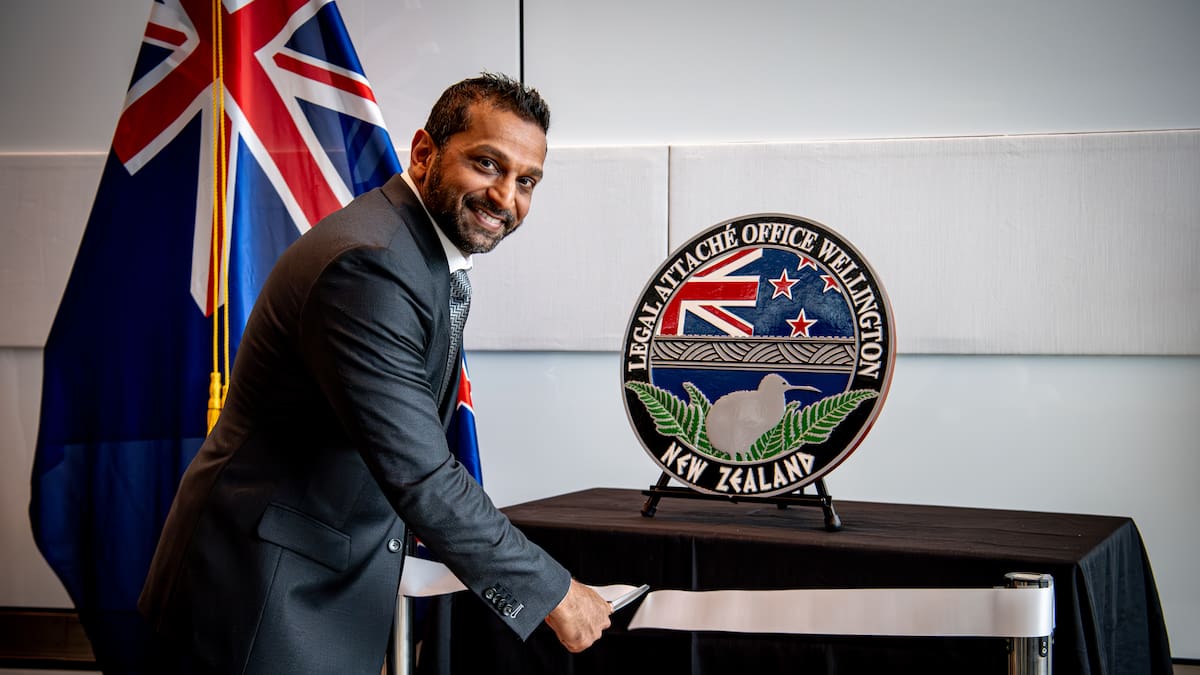The US Embassy said the new office will work with local police to address shared priority areas through joint investigations, information sharing and capacity-building.
It will work to investigate and disrupt a wide range of threats and criminal activities including terrorism, cybercrime and fraud, organised crime and money laundering, child exploitation and foreign intelligence threats. It will have responsibility for partnerships in New Zealand, Antarctica, Samoa, Niue, Cook Islands and Tonga.
Patel secretly dropped into Wellington last week, but his visit was sprung after Newstalk ZB noticed his plane at the airport and the Herald spotted him walking through the Beehive basement.
Patel this afternoon confirmed he had met with Minister responsible for spy agencies Judith Collins, Police Minister Mark Mitchell, Foreign Affairs Minister Winston Peters, Police Commissioner Richard Chambers, New Zealand Security Intelligence Service Director-General Andrew Hampton and Government Communications Security Bureau Director-General Andrew Clark.
His visit coincides with intensifying geopolitical competition in the Pacific region amid growing ties between China and some Pacific Island nations.
Collins said an increased FBI presence would enhance the “safety and security of New Zealanders”.
“We exchanged a range of insights on areas such as transnational organised crime, counter-terrorism, cyber-security and espionage,” she said.
Collins dismissed the suggestion the new office was in response to China’s influence in the Pacific.
“I think it’s about the transnational crime that we see, the increasing influence of major drug traffickers across the Pacific, but also interference in countries’ systems.
She said she didn’t expect a response from China: “This is our country, our sovereign right to do what we do.”
“I think the point is that it’s a US administration decision, and we’re happy to support it. It works well for New Zealand, it’s in our best interests.”
Foreign Minister Winston Peters said he spoke with Patel yesterday for about 40 minutes, a meeting which was briefly interrupted by the Civil Defence mobile phone alerts concerning possible tsunami activity.
He said New Zealanders should be “grateful” for the FBI’s interest in establishing an office in Wellington.
“It’s a really serious utility to add to our crime-fighting capacity in the Pacific and crime, drug dealing, narcotics [are] an awful scourge, and we’ve got to get on top of it, so it’s great news.”
He wouldn’t respond to questions about China’s possible reaction to the announcement.
Green MP Teanau Tuiono was strongly against the FBI’s presence in New Zealand and its potential impact on foreign policy.
“We are not another state of the United States; we shouldn’t be allowing foreign powers to be setting up shop like this.”
Labour’s Carmel Sepuloni said she wanted more information, saying the news had come as a surprise.
“I personally haven’t received an explanation. I think the general public is going to want to know what the rationale is for this. I think this is something that is quite serious.”
Act leader David Seymour said New Zealand and the US already cooperated in responding to transnational crime.
“Having an FBI office doesn’t really change that, it just strengthens that relationship with a long-term friend of our country.”
Patel is the most senior member of the US administration to visit New Zealand since President Donald Trump returned to office.
Patel is a key player in the ongoing controversy over Trump’s relationship with Jeffrey Epstein. Patel was said to be unhappy with a Justice Department decision to close the book on Epstein this year.
He denied rumours he would quit the role over the issue, taking to social media: “The conspiracy theories just aren’t true, never have been. It’s an honor to serve the President of the United States – and I’ll continue to do so for as long as he calls on me.”
